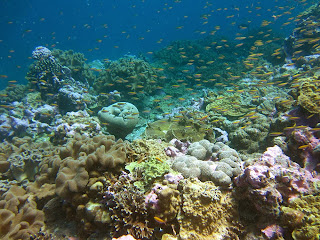Picture a coral reef with colorful fish flit between coral knobs, hiding in the crevices of branching coral. A manta ray glides by, majestically flapping its wings. But in one corner, small patches of green seaweed called macroalgae are beginning to grow. They start out small, but soon cover the coral colonies, gradually cutting off their access to light. Eventually the once vibrant seascape resembles a bumpy lawn of fleshy macroalgae carpeting the strangled coral.
 |
| Healthy reef seascape in Palau with low macroalgae growth. Photo by Hannah Barkley |
In contrast, macroalgae usually have far more trouble growing in these conditions. However, if the environment becomes more hospitable for macroalgae they can outcompete the corals, gradually overrunning the coral reef. Macroalgae do play a role on the reef by providing food for herbivorous fish, so they aren’t all bad, but it’s important that all the inhabitants of the reef live in balance rather than one tipping the scales and taking over at the expense of the others.
It would be great if scientists could pinpoint one factor that favors macroalgae over corals. Unfortunately, it looks like there are a lot of factors, some of which are very difficult to address. Extra nutrients entering the reef through fertilizer runoff or human waste, as well as the decline of herbivorous fish can give macroalgae a leg up.
 |
| Reef in Taiwan with macroalgae overgrowing corals. Photo by Tom DeCarlo |
Many of these processes are related to human activity, but there are also natural impacts on coral reef ecosystems. My team is interested in how natural climate swings can also affect reef health. On this expedition, we will collect as many corals as we can from many sites in the Caribbean to investigate coral health in the context of natural climate variability. Here we go!
-Alice Alpert
No comments:
Post a Comment